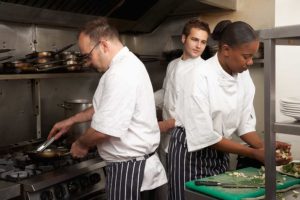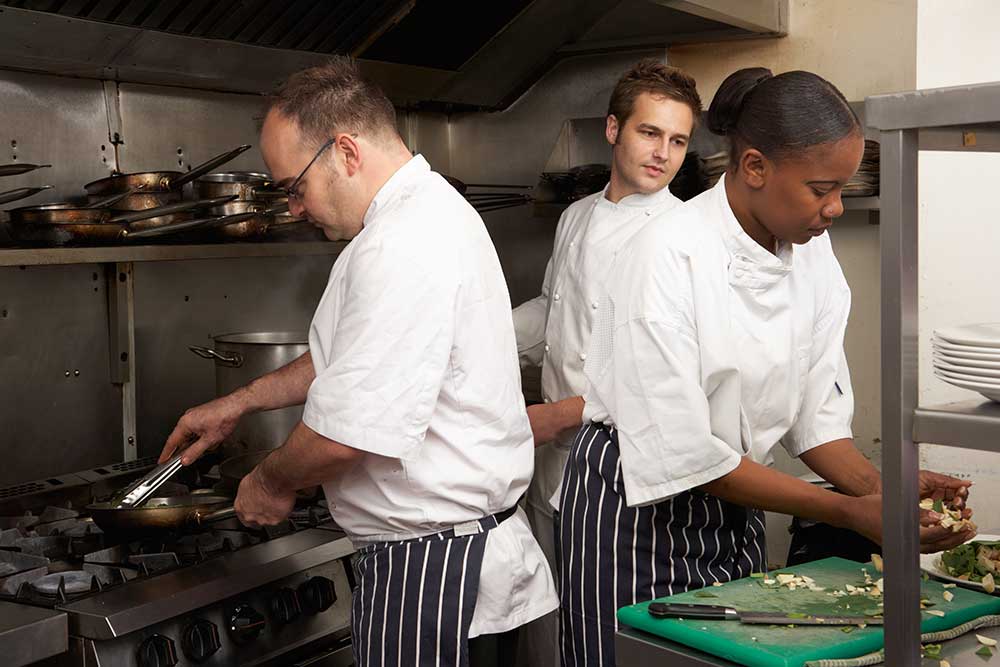Disclaimer: The information on our website is provided for general information purposes only. We make no representations or warranties of any kind, express or implied, about the completeness, accuracy, reliability, suitability or availability with respect to the website or the information contained on our website for any purpose. Any reliance on such information is therefore strictly at your own risk and we are not liable for any damages or losses arising out of or resulting from your reliance on any information contained on our website.
Though you may know that a cook prepares dishes at restaurants, they also have additional responsibilities and knowledge in food sanitation and safety. Cooks must also learn a variety of items to cook as they generally assist to cook every item on their restaurants menu. When they change employers, they would need to learn an entirely new menu of items or cuisine. Watch a video to learn what a cook does:
Benefits of being a Cook
Cooking offers a plethora of enticing benefits that resonate with those who have a passion for culinary arts. Foremost among these perks is the creative freedom it affords, allowing cooks to express themselves through their culinary creations and share their love for food with others. One of the most remarkable aspects of being a cook is the daily influx of new experiences, ensuring that the job remains perpetually engaging and far from monotonous.
Cooks also relish the opportunity to embark on a journey of cultural exploration through food, gaining insights into different traditions and cuisines. This profession provides avenues for advancement, enabling experienced cooks to climb the career ladder or even venture into entrepreneurship by opening their own culinary establishments. The versatility of a skilled cook’s expertise knows no bounds, as their culinary skills can be applied worldwide, ensuring a multitude of job opportunities.
For those passionate about passing on their culinary knowledge, teaching can be a fulfilling avenue, allowing them to mentor aspiring cooks and perpetuate the culinary tradition. Immediate feedback from satisfied clients further enhances job satisfaction, serving as a constant source of gratification. Additionally, working in the culinary field often means enjoying complimentary food and beverages while on the job, adding to the overall appeal.
Teamwork plays a significant role in the kitchen, fostering camaraderie and close-knit relationships among kitchen staff, turning colleagues into friends. In terms of compensation, cooks receive competitive salaries along with comprehensive benefits, including health insurance, sick leave, vacation time, and access to 401(k) retirement plans. Overall, being a cook offers a rich tapestry of benefits that cater to both the creative spirit and the practical aspects of a rewarding culinary career.
How to Become a Cook
There is no formal education required to become a cook. However, some employers may prefer a blend of formal education and experience depending the cooking skills required at the restaurant. Culinary programs are offered through community colleges, trade schools, and culinary schools that specialize only on this career path.
Cooks can also gain experience at restaurants doing prep work and then work their way up to becoming a cook. Even students in high school can gain experience working in the kitchen of a restaurant doing prep work. This type of work entry-level work can teach you best practices in sanitization and food storage and can also get you more skilled with using kitchen equipment such as knives, food processors, blenders, and more.
Another method to become a cook is join the military and train in the culinary arts. Watch one soldier’s journey into the culinary field.
Job Description of a Cook

Cooks often arrive before a restaurant, cafeteria, or other foodservice location opens and prepares for their day. They inspect their station, clean and sanitize the area, and make sure the ingredients and tools they will need for the day are in their proper place and are easily accessible. Having a properly set-up area is important because a kitchen can be a high-paced environment to work in.
Cooks must also be able to follow directions from a chef and recipes to ensure quality. Since cooks often have many items cooking at the same time, they must keep a watchful eye. This means cooks must be detail-oriented. In addition to their meticulous preparation routines, cooks must exhibit strong attention to detail as they juggle multiple dishes simultaneously. This heightened focus is crucial to ensure each dish lives up to the culinary standards set by the chef. These qualities collectively contribute to the seamless operation of the kitchen, resulting in the delectable dishes that patrons expect.
Free Teacher and Student Resources
Harvard University offers a free Science and Cooking course on EdX.org. Also, there is an option to pay a small fee to receive a certificate upon completion.
Cooks Career Video Transcript
The human need for nourishment and the pleasure of a good meal cannot be overstated. The cooks who prepare those meals from elegant restaurant dining to fast food production, have fast-paced careers with more facets than you might expect. Under the direction of chefs or food service managers, cooks follow recipes to prepare restaurant-sized portions. They measure and mix ingredients to create their assigned menu items, and may garnish them to be served. Items may range from breakfast omelets to salads, steaks, and desserts. They keep their work areas and equipment clean, following safe food handling procedures.
Cooks use a variety of equipment, including blenders, stoves, grills, many different pans, and sharp knives. Some kitchens employ many cooks, each assigned a particular area such as fry cook, vegetable cook, or others. Some cooks order supplies and plan the daily menu. In a fast-food setting, cooks prepare a limited menu to be kept warm until sold. Cafeteria cooks usually prepare a large quantity of a limited number of items, with a menu that changes regularly. Short-order cooks emphasize fast service and quick preparation, with items such as eggs, sandwiches, and french fries on the menu.
Private household cooks, also known as personal chefs, prepare meals according to a client’s preferences. They order groceries and supplies, clean the kitchen, and may cater social events. Most cooks work full-time in shifts that may include early mornings, late evenings, weekends, and holidays. Cooks in schools and institutional cafeterias usually work more regular hours. Cooks stand much of the time, and at rush times, experience high intensity in close quarters to produce meals quickly. Falls, burns, and cuts are hazards in this field. Most cooks learn their skills on-the-job. Although no formal education is required, some cooks attend culinary training programs of between 2 months and 2 years, while others learn through a 1 year apprenticeship.
Article Citations
Bureau of Labor Statistics, U.S. Department of Labor, Occupational Outlook Handbook, Cooks.
National Center for O*NET Development. 35-2014.00. O*NET OnLine.
The career video is in the public domain from the U. S. Department of Labor, Employment and Training Administration.

